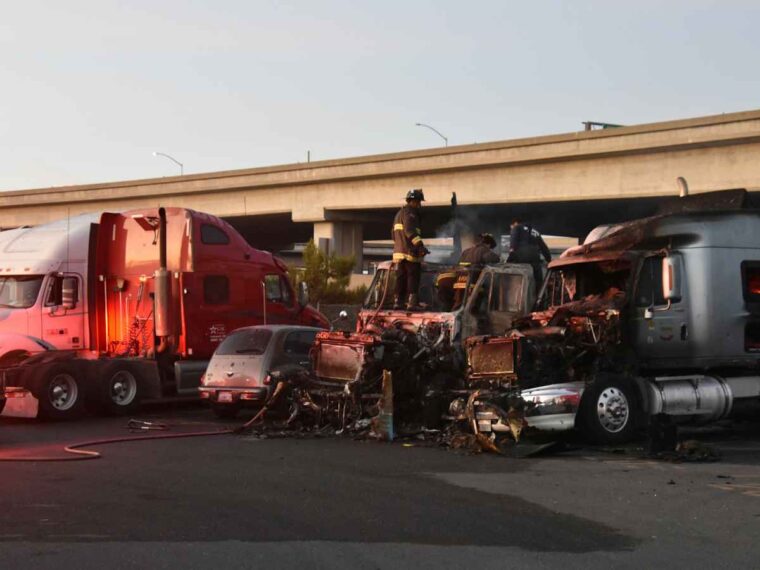Truck accidents are a major concern in Florida, particularly on high-risk roads like I-4, I-95, and the Florida Turnpike. These highways are some of the busiest in the state and are notorious for accidents involving commercial trucks.
If you’ve been involved in a truck accident on these roads, you might be overwhelmed with questions about what comes next. Who is at fault? How can you seek compensation?
Understanding the legal process can be a challenge, but don’t worry—this step-by-step guide will help you navigate the complexities of filing a truck accident lawsuit in Florida.
Accident What Are Truck Accident Lawsuits In Florida And How Do They Work?
Commercial truck accidents can cause serious injuries, property damage, and fatalities. In Florida, truck accident lawsuits involve several legal steps, with commercial truck accident settlements being the ultimate goal for compensation.
Understanding the process is essential for navigating the aftermath.
Step 1: Seek Medical Attention Immediately
After any truck accident, your health and safety should always come first. Even if you feel fine, it’s critical to see a doctor. Some injuries may not show symptoms right away, but could cause long-term damage.
- Seek Immediate Medical Help: Even for minor injuries, seeing a doctor ensures proper documentation.
- Get Detailed Medical Records: These records will be crucial for your lawsuit and settlement discussions.
Step 2: Report the Accident to the Authorities
Once you’re safe, make sure to report the truck accident to the local authorities. A police report will serve as a valuable piece of evidence in your lawsuit.
- Call 911: Law enforcement and emergency medical responders will arrive at the scene.
- File a Police Report: The officer will document the accident details, which can be important when establishing fault.
Step 3: Collect Evidence from the Scene
Gather as much evidence from the accident scene as possible. This will strengthen your case and help you in the commercial truck accident settlements later on.
- Take Photos of the Accident Scene: Capture images of the truck, vehicle damage, road conditions, and any visible injuries.
- Exchange Information: Get the contact details of the truck driver, witnesses, and any other involved parties.
- Get the Truck Driver’s Logs: Commercial truck drivers are required to maintain logs of their driving hours, which can be used to show potential negligence (like fatigued driving).
Step 4: Identify and Establish Fault
A key aspect of truck accident lawsuits is determining fault. In Florida, “comparative negligence” allows fault to be shared, with the more responsible party paying a larger share of the damages.
- Commercial Truck Drivers’ Responsibility: Truck drivers are required to follow strict regulations set by the Federal Motor Carrier Safety Administration (FMCSA). This includes limits on driving hours and requirements for truck maintenance.
- Employer Liability: If the driver was working under their employer’s instructions, the employer might also be held accountable for the accident.
Step 5: Contact a Truck Accident Lawyer
Once you’ve gathered your evidence and identified a potential fault, it’s time to seek legal help. A lawyer with experience in truck accidents can guide you through the entire process.
- Why You Need a Lawyer: Truck accident cases are complex, and having professional legal representation ensures your rights are protected.
- Choosing the Right Lawyer: Look for a lawyer with experience in commercial truck accidents specifically. They’ll be familiar with commercial truck accident settlements and the nuances of Florida law.
Step 6: File Your Claim
In Florida, the statute of limitations for filing a truck accident lawsuit is four years. It’s best to start early to gather evidence, and your lawyer will guide you through filing the claim.
- Negotiation Process: Once the lawsuit is filed, both parties may engage in negotiations. The goal is to settle before going to trial.
- Be Prepared for Settlement Discussions: If the settlement is favorable, you can resolve the case without going to court. If not, the case may proceed to trial.
Step 7: Going to Trial (If Necessary)
If a fair settlement is not reached, your case will go to trial. In court, both sides will present their arguments, and a judge or jury will decide the outcome.
- What Happens in Court: During the trial, both sides will present evidence, call witnesses, and make their case.
- Trial Duration: Truck accident lawsuits can take time, so be prepared for a lengthy legal process.
Step 8: Receiving Your Settlement or Verdict
Once the case is resolved, either through settlement or court verdict, you will receive compensation for your damages. The amount may vary depending on factors like:
- Medical Expenses: Treatment for injuries sustained in the crash.
- Lost Wages: Compensation for time missed from work due to injuries.
- Pain and Suffering: Non-economic damages for physical and emotional distress.
Final Thought
Truck accident lawsuits in Florida can be complex, but understanding the process and working with an experienced lawyer can improve your chances of success. From seeking medical attention to collecting evidence and negotiating settlements, each step is essential.
Consulting a lawyer ensures you take the right actions to protect your rights and secure fair compensation.





